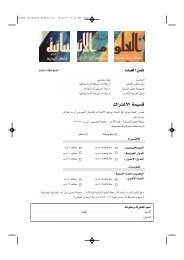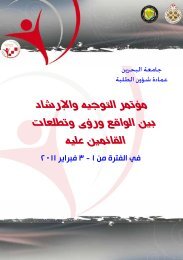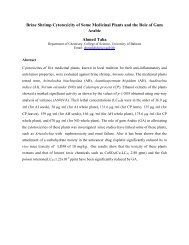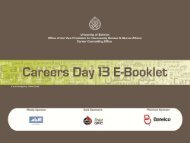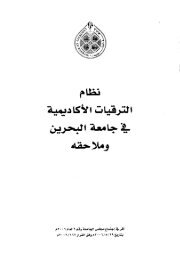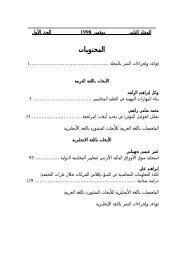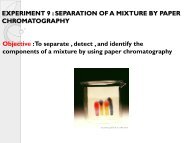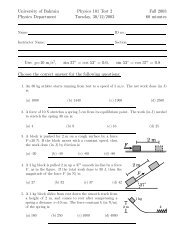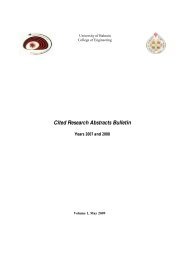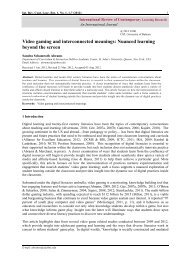د. ÙÙا بÙت عÙ٠اÙÙعÙ٠٠د. ÙÙÙÙÙÙÙÙادر ÙاظÙÙÙÙÙÙÙÙ٠د. ج٠ا٠... - جا٠عة اÙبØرÙÙ
د. ÙÙا بÙت عÙ٠اÙÙعÙ٠٠د. ÙÙÙÙÙÙÙÙادر ÙاظÙÙÙÙÙÙÙÙ٠د. ج٠ا٠... - جا٠عة اÙبØرÙÙ
د. ÙÙا بÙت عÙ٠اÙÙعÙ٠٠د. ÙÙÙÙÙÙÙÙادر ÙاظÙÙÙÙÙÙÙÙ٠د. ج٠ا٠... - جا٠عة اÙبØرÙÙ
Create successful ePaper yourself
Turn your PDF publications into a flip-book with our unique Google optimized e-Paper software.
2 0 1 1<br />
192<br />
a world or society yet<br />
concretely destined to<br />
become inscribed within a<br />
world and within a society”<br />
(p. 107).<br />
Without having more explanation from Badiou<br />
about what he meant by consciousness-oftruth,<br />
it was possible to see, however, how it<br />
alluded to the Christian terms ‘consciousness<br />
of Christ’ or ‘consciousness of church’. A<br />
consciousness-of-truth could then be thought<br />
of as a state of a direct knowledge of truth,<br />
without having to apply reason, as in Greek<br />
philosophical discourse, or use of signs or<br />
miracles, as in the Jewish prophetic discourse.<br />
Badiou used consciousness-of-truth to<br />
describe the state of the subject that has been<br />
transformed and made ready to enter the realm<br />
of Universalism.<br />
Using the terms Being and Event as Badiou<br />
established them in his Being and Event book;<br />
we can describe how this transformation<br />
occurs. The key to universalism, according to<br />
Badiou, is the opening up of a generic set of<br />
a being of truth, and thus making it possible<br />
for a subject that belongs to a particular set<br />
to have, through its faith in an event that was<br />
declared as true by another subject, a sort<br />
of a consciousness-of-truth that enables it<br />
to transgress its established set, and thus to<br />
enter a universal set to which anybody can<br />
subscribe. The consciousness-of-truth is the<br />
state in which the transformed subject finds<br />
itself, after it submits to faith in the declared<br />
event. The founding of a universal set, where<br />
the discourse of truth is removed from the<br />
distinctive communitarian sets of the Greeks<br />
and the Jews (the historical aggregates) was,<br />
according to Badiou, the contribution of Paul.<br />
So, what are, according to Badiou, the generic<br />
conditions of a universal truth? A truth that<br />
meets the generic conditions is one that despite<br />
being situated in the world “does not retain<br />
anything expressible from that situation”<br />
(Being and Event xiii). The work of truth in<br />
this context is that of a ‘generic procedure’<br />
and the subject is constituted by becoming an<br />
active dimension of such procedure.<br />
Paul as a Revolutionary Militant<br />
As Badiou was seeking to rethink the structure<br />
of the Political through Paul, he has not lost<br />
faith in the power of revolutionary politics. In<br />
seeking exactly to strengthen such politics by<br />
retrieving through Paul a model for thinking<br />
the event and living militantly, he was<br />
motivated by the potency of Paul as a militant<br />
figure.<br />
The ‘militant of truth’ subject, according to<br />
Badiou, is that who is actively proclaiming<br />
an event of truth. The militant of truth is<br />
the ‘artist-creator’, who “opens up a new<br />
theoretical field”, while “working for the<br />
emancipation of humanity in its entirety.”<br />
(Being and Event p.xiii) It is useful to<br />
remember here that Badiou’s reading of Paul<br />
in this book was already initiated in his earlier<br />
book Being and Event in his 21 st mediation<br />
about Pascal. In contrasting between Paul and<br />
Pascal in relation to the truth event, Badiou in<br />
consequence contrasted between ‘traditional’<br />
communist revolutionaries and his own post-<br />
Marxist conception of militancy. The event for<br />
Paul and Pascal was Christ, while it was, and<br />
probably still is, for Badiou and his ‘comrades’,<br />
the revolution. Pascal saw the Christ event<br />
as mediation, or in Badiou’s mathematical<br />
language, a ‘function’, through which we<br />
get the knowledge of God and Christianity.<br />
- 9 -



